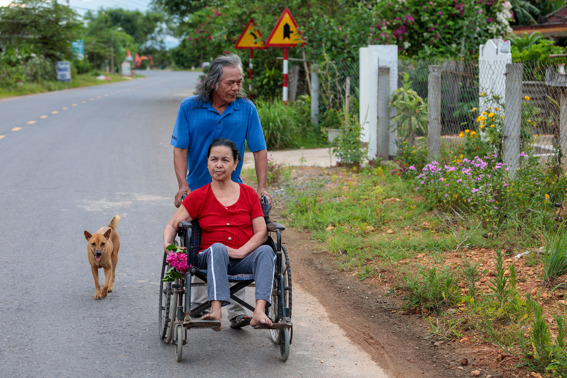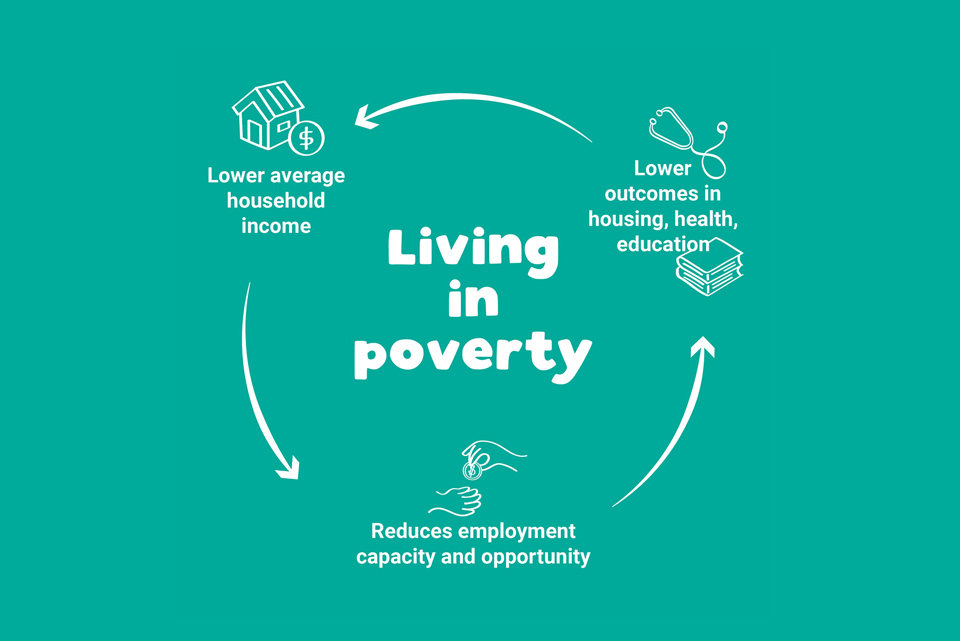A husband. A barber. A farmer. A business owner.
Thu is one of the many people living with a disability in Vietnam who must do all he can to provide for his family. When he was 12, Thu lost his leg after stepping on a unexploded land mine during the Vietnam war. People living with a disability in Vietnam can face lifelong discrimination and disadvantage.
"It is hard to get a job in rural areas where people earn their living mainly from farming…there is often drought in summertime and flood in rainy season. Life is extremely difficult,” says Thu.
In addition to being the breadwinner for his family, Thu had to care for his wife, Linh, after she suffered a stroke.
“She is my wife and we have been living together and depending on each other, I am the one to be there with her and for her,” says Thu.
Living with a disability in rural Vietnam presented many challenges for Thu, who worked mainly as a rice farmer. But farming is dependent on weather, which has become unpredictable with the impacts of climate change.
With your generosity, Thu can diversify his income and start his own business so that he can support his wife as she recovers from her stroke.

Thu putting on his prosthetic leg at his home in Quang Tri province, Vietnam. Photo: Phan Tan Lam/Caritas Australia
Video
Thu's story
Thu was determined to be financially independent
Thu and Linh's lives changed when they joined the Empowerment of People with Disabilities program, run by Caritas Australia’s local partner in Vietnam, the Centre for Sustainable Rural Development (SRD).
“Many people with a disability in Vietnam feel that other people would only look at their disabilities rather than at their capacities,” says Toan Tran, SRD Program Manager.
“Most adults and children with disabilities are from low-income groups and people with disabilities and their families have minimal opportunities to access health care service, education, income generation, vocational training and jobs.”
The Empowerment of People with Disabilities program supports people living with disabilities to establish Village Savings and Loans Associations (VSLA) so that they can access affordable loans and become financially independent. Previously, Thu had to borrow high-interest loans from moneylenders, but through the VSLA, he was able to obtain a low-interest loan, which he used to open his own barber shop on a new road that was constructed near his home.
Thu also joined an incense-making group and, with the extra income, he could repair his house and reconstruct his front yard to prevent flooding during the rainy season. He plans to invest in livestock, such as pigs, ducks or chickens, to further diversify his income.

Thu (left) helps make incense sticks with fellow members of his VSLA (Village Savings and Loans Association) group near his home in Quang Tri province. Photo: Phan Tan Lam/Caritas Australia

Thu works in his rice fields near his home in Quang Tri province, Vietnam. Photo: Phan Tan Lam/Caritas Australia
Many people with disability don't have access to specialised rehabilitation devices

Thu (right) helps make incense sticks with fellow members of his VSLA (Village Savings and Loans Association) group near his home in Quang Tri province. Photo: Phan Tan Lam/Caritas Australia
Lower capacity to earn an income often resulting in high loan applications

Thu and his wife Linh live in the Quang Tri province, Vietnam. After Linh suffered a stroke, Thu became her primary carer. Photo: Phan Tan Lam/Caritas Australia
Discrimination or exclusion can affect their future education and employment prospects
The Cycle of Poverty
The causes of poverty are complex and interlinked. Historical circumstances, like conflict and wars, can create poverty, but even during adverse world events, certain groups are more likely to face challenges than others.
Vulnerable communities and families trapped in the cycle of poverty have few to no resources to help them develop their livelihoods.
Those born in vulnerable communities often have less access to healthcare, housing, education and employment. The cycle will often continue from generation to generation until assistance can be given to them to forge a path out of poverty.


Thu and his wife Linh live in the Quang Tri province, Vietnam. After Linh suffered a stroke, Thu became her primary carer. Photo: Phan Tan Lam/Caritas Australia
For All Future Generations
Thu’s story is just one example from Project Compassion, demonstrating the powerful impact that each one of us can have For All Future Generations.
Since its inception in 1965, generations of compassionate Australians have participated in Project Compassion, making it one of the nation's longest running charity campaigns.
Your contribution will go towards supporting people where the need is greatest. Together, we can create lasting change for people like Thu living in some of the most vulnerable and low-income regions in the world.












